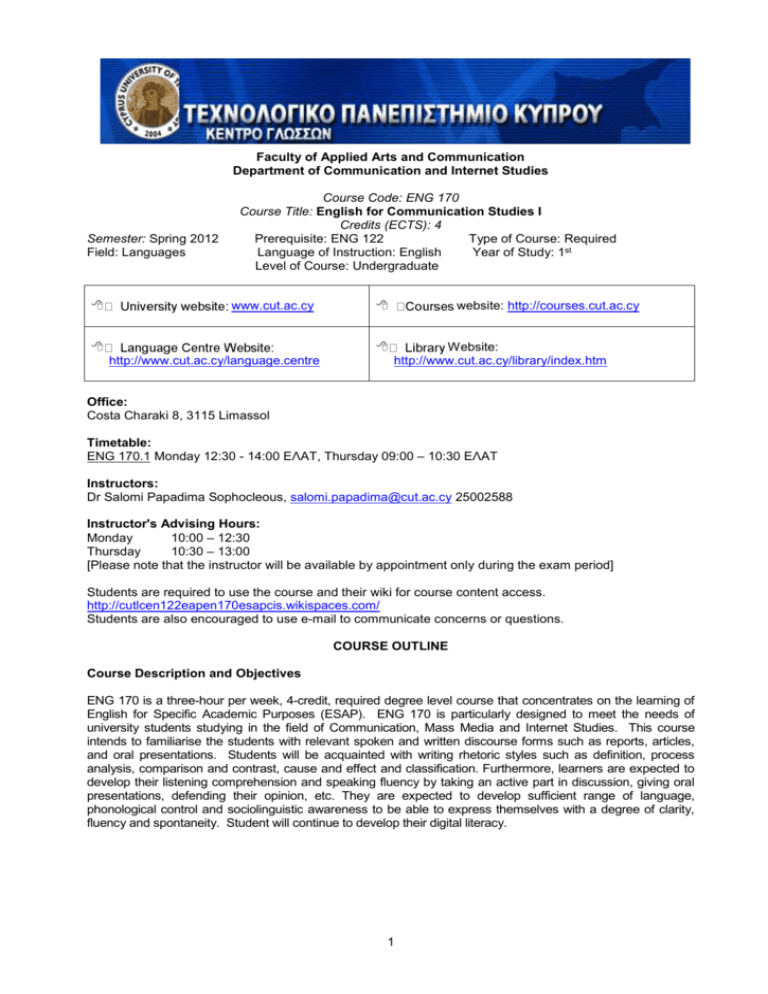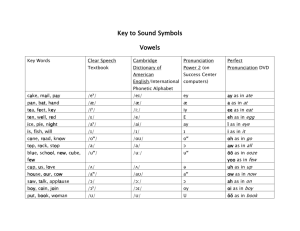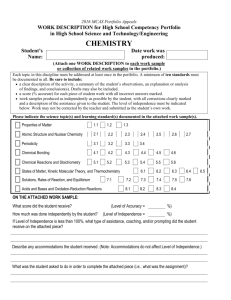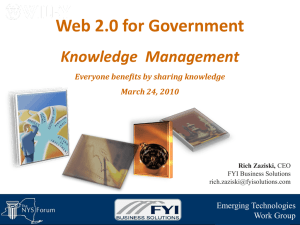
Faculty of Applied Arts and Communication
Department of Communication and Internet Studies
Semester: Spring 2012
Field: Languages
Course Code: ENG 170
Course Title: English for Communication Studies I
Credits (ECTS): 4
Prerequisite: ENG 122
Type of Course: Required
Language of Instruction: English
Year of Study: 1st
Level of Course: Undergraduate
www.cut.ac.cy
http://www.cut.ac.cy/language.centre
website: http://courses.cut.ac.cy
Website:
http://www.cut.ac.cy/library/index.htm
Office:
Costa Charaki 8, 3115 Limassol
Timetable:
ENG 170.1 Monday 12:30 - 14:00 ΕΛΑΤ, Thursday 09:00 – 10:30 ΕΛΑΤ
Instructors:
Dr Salomi Papadima Sophocleous, salomi.papadima@cut.ac.cy 25002588
Instructor's Advising Hours:
Monday
10:00 – 12:30
Thursday
10:30 – 13:00
[Please note that the instructor will be available by appointment only during the exam period]
Students are required to use the course and their wiki for course content access.
http://cutlcen122eapen170esapcis.wikispaces.com/
Students are also encouraged to use e-mail to communicate concerns or questions.
COURSE OUTLINE
Course Description and Objectives
ENG 170 is a three-hour per week, 4-credit, required degree level course that concentrates on the learning of
English for Specific Academic Purposes (ESAP). ENG 170 is particularly designed to meet the needs of
university students studying in the field of Communication, Mass Media and Internet Studies. This course
intends to familiarise the students with relevant spoken and written discourse forms such as reports, articles,
and oral presentations. Students will be acquainted with writing rhetoric styles such as definition, process
analysis, comparison and contrast, cause and effect and classification. Furthermore, learners are expected to
develop their listening comprehension and speaking fluency by taking an active part in discussion, giving oral
presentations, defending their opinion, etc. They are expected to develop sufficient range of language,
phonological control and sociolinguistic awareness to be able to express themselves with a degree of clarity,
fluency and spontaneity. Student will continue to develop their digital literacy.
1
Required Textbook
Ceramella, Nick and Lee, Elizabeth (2008). Cambridge English for the Media. Cambridge: Cambridge
University Press.
Additional materials such as handouts and articles will be provided to students for support.
Other Requirements
All the classes will be held in computer labs. Students are expected to have their own memory stick (USB
drive). Personal computers with MS Office including Internet access for students’ use at home will be
helpful.
Students are expected to use the Resources on the course wiki.
Learning Outcomes:
After completion of the course students are expected to be able to:
1. Demonstrate awareness of the writing process, sentence structure, punctuation and
spelling
2. Demonstrate ability to write cohesive and coherent texts of the size of a paragraph or
longer
3. Demonstrate the ability to write texts of different types (articles, …, …) and rhetoric
styles (definition, …, …) at academic level
4. Demonstrate the ability to paraphrase, summarise, quote and avoid plagiarism
5. Demonstrate the ability to recognise the APA referencing system and create
bibliographies according to this style
6. Demonstrate awareness of the speaking process, and characteristics of spoken texts
such as lecture, public speech, and conversation.
7. Demonstrate the ability to listen to conversations, interviews, lectures and public
speeches and understand the main points
8. Demonstrate the ability to improve pronunciation
Course Contents:
Listening/Speaking
1. Understand spoken language such as dialogues, announcements, instructions, messages,
discussions, interviews, debates, talks, reports, lectures, TV programmes and films, related
to Communication and Internet Studies.
2. Order and present information, related to Communication and Internet Studies.
3. Evaluate information and select what is relevant to a specific purpose and audience.
4. Communicate effectively and appropriately in a variety of situations such as description,
explanation of points of view, discussion on familiar topics, expression of opinion, report,
conversation, discussion, dialogue, summary, account, presentation, etc., related to
Communication and Internet Studies.
Reading
5. Extend reading and comprehension techniques (skimming, scanning, finding main idea,
inferring meaning, etc.), related to Communication and Internet Studies
6. Read independently and understand meaning of a wide range of mainstream text-types such
as short stories, song lyrics, cyber texts, magazine articles, correspondence, reports, etc.,
related to Communication and Internet Studies.
Writing
7. Demonstrate an awareness of the process of paragraph and short text writing (generating
ideas; considering subject, purpose and audience; planning, drafting and revising);
paragraph structure and coherence.
8. Develop unity and language use.
9. Compose effective topic sentences and thesis statements.
10. Produce clear introductions, body paragraphs and essays using different patterns of
development including: narration, description, illustration, comparison and contrast,
definition, process analysis, classification, persuasion, cause and effect.
11. Produce clear introductions, body paragraphs and conclusions for essays.
12. Enrich vocabulary.
Grammar and Mechanics
13. Review and consolidate English grammar and mechanics, related to the topics covered:
Ensure correct uses of verbs; independent and independent clauses; correct word order,
subject/verb agreement; correct uses of coordinating, subordinating, and correlative
conjunctions, appropriate transition words, and various other cohesive devices; capital
letters; correct punctuation related to meaning; formal and informal registers; spelling.
2
Teaching Methods:
Lectures, workshops, individual / whole class / pair / group work, digital communication,
student presentations, discussions, participation, class / homework tasks, and Portfolio
Assignments, online work.
Recommended Supplementary Materials
- - Printed
A good learner’s dictionary, such as:
Longman Dictionary of Contemporary English. Pearson Longman.
Cambridge’s Advanced Learner’s Dictionary. Cambridge University Press.
Concise Oxford English Dictionary. Oxford University Press.
Macmillan English Dictionary for Advanced Learners. Macmillan.
Dictionary of Mass Communication & Media Research: A Guide for Students, Scholars And Professionals,
by Demers, D.P. Marquette Books
A Dictionary of Communication and Media Studies, by Watson, J. & Hill, A., A Hodder Arnold Publication
- - Online
Websites such as:
Cambridge Online Dictionaries http://dictionary.cambridge.org/
British National Corpus http://www.natcorp.ox.ac.uk/
Online English Dictionary http://www.yourdictionary.com/
Merriam-Webster Online Dictionary http://www.merriam-webster.com/mw/netdict.htm
English Idioms and Quizzes http://www.idiomconnection.com/
Online Dictionary with Sound http://www.thefreedictionary.com/
Greek-English, English-Greek Online Dictionary http://www.in.gr/dictionary/
English Pronouncing Dictionary with Instant Sound http://www.howjsay.com/
Online Thesaurus http://thesaurus.reference.com/
Online Newspapers http://www.onlinenewspapers.com
Glossary of Internet Terms http://www.matisse.net/files/glossary.html
A Glossary of Computer and Internet Terms http://www.sharpened.net/glossary/
A Glossary of World Wide Web Terminology http://www-personal.umich.edu/~zoe/Glossary.html
A Glossary of World Wide Web Terms and Glossary
http://lipas.uwasa.fi/comm/termino/collect/special/computing.html
The Internet Dictionary http://www.netlingo.com/
Time Magazine http://www.time.com/time/
BBC World News: Click http://www.bbcworldnews.com/Pages/ProgrammeMultiFeature.aspx?id=18
Assessment
- - Grading Policy
Final Examination
40%
Midterm Examination
20%
Class and Homework Assignments
30%
Class Attendance, and Participation
10%
3
Course Regulations and Policies
- - Attendance and Punctuality
It is widely known that there is a strong correlation between regular attendance and good performance in a
course. Therefore, regular attendance is required. Punctuality is also very important. It ensures courtesy
towards the rest of the class.
If you miss a class it is your responsibility to catch up with the missed work and submit any work due.
Two late arrivals to class equal to one absence, so be punctual (!)
- - Exams and Tests
Students must attend all examinations/tests. Failure to do so will result in a zero (0) grade awarded for the
particular examination/test and the student’s grade will be based on the remaining examinations/tests.
There are no make-up exams, except for very exceptional circumstances and after consultation with the
instructor.
- - Mobile Phones
Mobile phones should be switched off and kept away from your desks.
- - Plagiarism and Cheating
Plagiarism includes copying or paraphrasing another’s words, ideas or facts without crediting the source;
submitting a paper written by someone else, either in whole or in part, as one’s own work; or submitting
work previously submitted by another course or lecturer. Cheating and plagiarism are serious disciplinary
offences and will not be tolerated. Students caught will have their work/examination disqualified and
further disciplinary action will be taken. Plagiarism is an academic crime and students will risk complete
failure of the course if they plagiarise. Whenever written material is used, the source of that information
should always be acknowledged.
- - Submission of Assignments/ Projects
Assignments are due at the BEGINNING of class on the DUE DATE. Class time may NOT be used to
complete late assignments.
Work submitted after deadlines will result in reduction of the grade for that assignment by 1 mark (out
of 10) for each day it is late.
4
Tentative Course Outline
Spring Semester 2012
Week & Date
1
16-20/01/12
2
23-27/01/12
3
30/0103/02/12
4
06-10/02/12
5
13-17/02/12
6
20-24/02/12
Topic
Session 1
Introduction to the Course and the course wiki
Definition of Communication (dictionary, encyclopaedia, thesaurus)
European Portfolio
Session 2
Communication Skills and Effective Communication
Communication Quiz
Wiki Online Electronic Portfolio
Session 1
The History of Communication: Genre, Stages
Genre Explained: Media Texts
Daily Communication activities log
Commenting on each other's logs
Wiki Online Electronic Portfolio
Session 2
Daily Communication activities log – Discussion (Importance of Communication)
Identify different Rhetoric Styles (text types)
Media genre (oral and written)
Wiki Online Electronic Portfolio
Session 1
Introduction to Media, Mass Media and Social Media
Wiki Online Electronic Portfolio
Pronunciation iPod Project Introduction 1
Session 2
Social Media
Summary Writing
Wiki Online Electronic Portfolio
Pronunciation iPod Project 2
Session 1
Types of Articles
Article Review Conventions
Wiki Online Electronic Portfolio
Pronunciation iPod Project 3
Session 2
APA referencing style
RefWorks workshop
Wiki Online Electronic Portfolio
Pronunciation iPod Project 4
Session 1
Newspapers (Cambridge English for the Media, Unit 1)
Session 2
Newspapers (Cambridge English for the Media, Unit 1)
Summarising a Newspaper Article
Wiki Online Electronic Portfolio
Pronunciation iPod Project 5
Session 1
Newspapers (Cambridge English for the Media, Unit 1)
Pronunciation iPod Project 6
Session 2
Newspapers (Cambridge English for the Media, Unit 1)
Writing a Newspaper Article
Wiki Online Electronic Portfolio
5
7
27/0202/03/12
27/02 Public
Holiday
8
05-09/03/12
9
12-16/03/12
10
19-23/03/12
11
26-30/03/12
12
02-06/04/12
09-20/04/12
13
23-27/04/12
30/0403/05/12
04-19/05
Session 1
Revision and Mock Mid-Term Examination
Wiki Online Electronic Portfolio
Session 2
Mid-Term Examination
Wiki Online Electronic Portfolio
Session 1
Lectures (The Internet, The Future of Journalism)
Wiki Online Electronic Portfolio
Pronunciation iPod Project 7
Session 2
Lectures and Note-taking: Listening and Note-taking
Wiki Online Electronic Portfolio
Pronunciation iPod Project 8
Session 1
Writing a mini-lecture script
Wiki Online Electronic Portfolio
Pronunciation iPod Project 9
Session 2
Giving a mini-lecture
Wiki Online Electronic Portfolio
Pronunciation iPod Project 10
Session 1
Magazines (Cambridge English for the Media, Unit 3)
Wiki Online Electronic Portfolio
Session 2
Magazines (Cambridge English for the Media, Unit 3)
Session 1
Magazines (Cambridge English for the Media, Unit 3)
Planning to write a true-life story
Session 2
Magazines (Cambridge English for the Media, Unit 3)
Writing a true-life story
Wiki Online Electronic Portfolio
Session 1
Television (Cambridge English for the Media, Unit 4)
Wiki Online Electronic Portfolio
Session 2
Television (Cambridge English for the Media, Unit 4)
Wiki Online Electronic Portfolio
Easter Holidays
Session 1
Television (Cambridge English for the Media, Unit 4)
Wiki Online Electronic Portfolio
Session 2
Revision and Mock Final Exam
Final work Submission on Wiki Online Electronic Portfolio
Wiki Online Electronic Portfolio
Exam Preparation
Wiki Online Electronic Portfolio
Exams
In this course, success and enjoyment depend on your effort, participation and positive attitude.
Good luck and here’s to a happy semester!
6








